Dental Implants – Arlington, TX
A Tooth Replacement Solution
To Rival Them All
Whether you have a single gap in your arch or you’re missing an entire row of teeth, this problem can make life difficult by affecting your chewing and speaking abilities. While traditional tooth replacement treatments may be the best option for some patients, Dr. Whitmore also offers dental implants and coordinates with the best oral surgeons in Arlington, TX. This is one of the most advanced restorative procedures, and it can provide you with a wealth of benefits since the end results are so similar to your natural teeth!
Why Choose Robert A. Whitmore, DDS
for Dental Implants?
-
American Academy of
Implant Dentistry Member -
Panoramic
X-Rays -
Partners With The
Best Oral Surgeons
What is a Dental Implant?

A dental implant is a small, titanium post that can be surgically placed below your gumline to replace the missing root-portion of a tooth. The metal is biocompatible, allowing it to fuse with your jawbone and provide the area with necessary blood flow and stimulation. Atop the implant will be placed an abutment, which is a metal connector piece that secures the restoration in place. The number of teeth you need replaced will determine how many dental implants are required to be placed.
The 4-Step Dental Implant Process

As one of the most successful methods for rebuilding people’s smiles, dental implants generally involve a multi-step process for ensuring your restoration(s) have a long and healthy lifespan. Our team will walk you through the entire treatment plan so that you know what to expect every step of the way to replace your missing tooth/teeth. Until then, read on to get a brief look at the dental implant process.
Initial Dental Implant Consultation
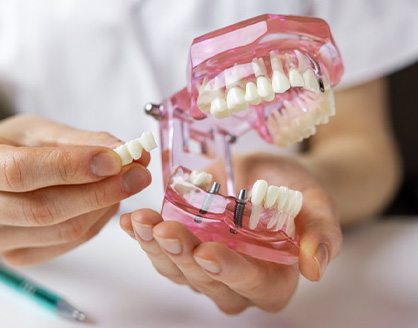
During your first visit with us, our team will thoroughly evaluate your oral health as well as take measurements and impressions of your jaw and gum line. This will allow us to develop a proper strategy on how and where to place your dental implants for the ideal results. We’ll also need to confirm that you are free of any underlying complications that could increase the risk of failure later on, such as decay, gum disease, low jawbone density, or infection. If necessary, you’ll have to undergo preliminary services to prepare you for the procedure ahead, such as periodontal treatment, tooth extraction, or bone grafting. Once you’re ready, we can schedule you for your surgery.
Dental Implant Surgery
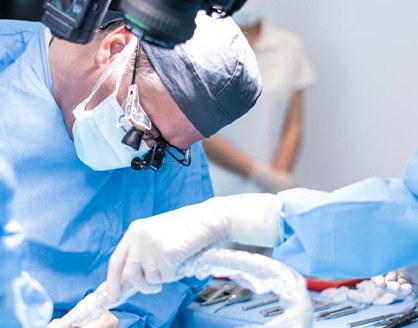
Dr. Whitmore partners with the best oral surgeons in the area to provide you with amazing results. Before starting your procedure, your team will administer a local anesthetic to numb your mouth so that you’re free of any discomfort or pain during your visit. You might even be sedated so that you can be as relaxed as possible. Once they can verify that you’re safe and comfortable, they’ll make a small incision in your gums to reach your jawbone, where they will place your implants before suturing your tissue around them. You’ll then have your trusted friend or family member take you home so you can rest.
Dental Implant Osseointegration & Abutment
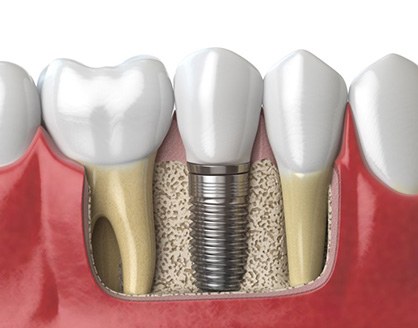
Following your surgery, you should expect it to take three to six months to completely recover depending on your situation and oral habits. During your healing period, your dental implants will need to undergo osseointegration so that they can fuse effectively with your jawbone. Once finished, you’ll be able to enjoy an incredibly sturdy and long-lasting foundation for your restoration. You’ll then return to our office so that we can place your abutments, and then we’ll take impressions of your mouth to develop your custom crown, bridge, or denture.
Delivery of Dental Implant Restoration(s)

Once your gums have healed, you’ll come back to our team so that we can provide you with your brand-new pearly whites. We’ll double-check that your bite is correct and that you’re satisfied with your results before sending you on your way. With daily brushing, flossing, and routine checkups and cleanings with our experienced dental hygienists, you’ll be able to continue to enjoy your restorations for several decades to even a lifetime.
Benefits of Dental Implants

Dental implants offer a variety of unique benefits that make them so popularly recommended among patients and professionals alike. Some of these advantages include:
- Preservation of full facial structure.
- Prevention of jawbone deterioration.
- Natural-looking artificial teeth.
- Enhanced eating and speaking abilities.
- Added strength and stability.
- Eliminate slipping and shifting.
- Keep surrounding teeth from drifting out of place.
- Boosted self-confidence.
- No alteration of surrounding healthy teeth required.
- Can last 35+ years with daily maintenance.
Who Dental Implants Can Help

Before you can have dental implants placed, you will need to have your mouth examined to confirm that you are a good candidate for the procedure. Note that dental implants can be used to replace any number of missing teeth, making it a great option for anyone who can undergo the surgery. Below is a summary of what makes a good dental implant candidate as well as the different types of tooth loss that dental implants can help resolve.
Who Is a Good Candidate for Dental Implants?

In order to receive dental implants, you need to meet the following criteria:
- You need to be healthy enough to have minor oral surgery performed.
- You need to be in good oral health overall. In particular, your mouth should be free of gum disease, which is known to cause serious dental issues for dental implants if it is not properly treated.
- You need to have enough bone density in your jaw to provide your dental implant posts with the support that they need.
Note that even if you don’t currently meet the criteria listed above, dental implants aren’t necessarily out of your reach. Bone grafting, gum disease treatment, and other preliminary procedures can be used to address the obstacles that are standing between you and a sturdy new smile.
Missing One Tooth

The number of dental implant posts you receive can vary depending on how many teeth have been lost. When only one tooth is missing, the math is quite straightforward: a single dental implant post can be used to fill in the gap. After the post has finished fusing with the jawbone, it will be capable of supporting a crown, which can be customized in order to resemble a natural tooth as closely as possible.
Missing Multiple Teeth

If you have lost three or more consecutive teeth, they can be replaced all at once with a dental bridge supported by two dental implants. Unlike a traditional bridge, an implant bridge doesn’t require making any alterations to your remaining teeth, so you can keep more of your natural enamel.
Of course, sometimes there might be more than one gap in your smile to fill. In this situation, it may be possible to get a partial denture supported by dental implants. The number of implant posts needed can vary depending on the specifics of the situation.
Missing All Teeth

Even if you have lost every single tooth in one arch, dental implants could still be the answer for reclaiming a complete smile. A number of dental implant posts (usually about four to six) can be inserted into the jaw to act as the roots for fully personalized dentures. One notable feature of implant dentures is that while they can be removable, they are often designed to stay fixed in place at all times, which allows you to brush them as if they were natural teeth.
How Dental Implants Work

Dr. Whitmore partners with the best oral surgeons in the area to provide you with amazing results. After your surgery, our team will handle the rest of the procedure, including the abutment placement, crafting of your restorations, and placement of your final artificial teeth. With daily brushing, flossing, and routine checkups and cleanings with our experienced dental hygienists, you’ll be able to continue to enjoy your restorations for 35 or more years.
Understanding the Cost of Dental Implants

If you’re struggling with tooth loss, dental implants can be an investment in your health and confidence. They offer several unique benefits that other tooth replacements don't, making them worth the upfront price for many patients. At Robert A. Whitmore D.D.S., we tailor each treatment to the needs of individuals, so the cost may vary depending on many factors. Read more below to see how we piece together the cost of your implants and how we can help you fit your treatment into any budget.
Preliminary Treatments & Dental Implant Surgery

The total cost of dental implants can encompass more than just the implant placement procedure. For some patients, preliminary treatments, such as bone grafting or extractions may be necessary to prepare their smile for surgery.
The implant procedure itself is performed with precision and advanced technology by one of our local partnered oral surgeons. Therefore, the price for the surgical part of your treatment will depend on them.
The Parts of Your Dental Implant
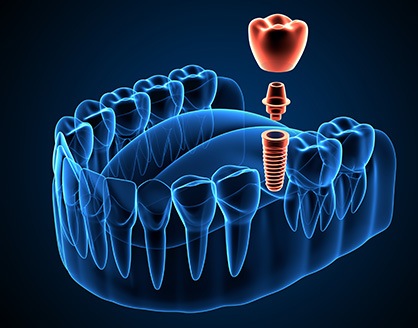
Each dental implant consists of three parts that work together to restore your smile:
- Implant Fixture: A small screw, usually made of titanium, that is placed into your jawbone, acting as an artificial tooth root.
- Abutment: A connector that secures the restoration to the implant.
- Restoration: A lifelike tooth replacement that sits on top of the connector, crafted to match your natural teeth. This can be a crown, bridge, or even a denture depending on your treatment plan.
At our Arlington office, we only use high-quality materials to ensure strength, function, and aesthetics. This can increase the overall cost, but it avoids any risks that may occur due to inferior materials.
How Dental Implants Pay for Themselves
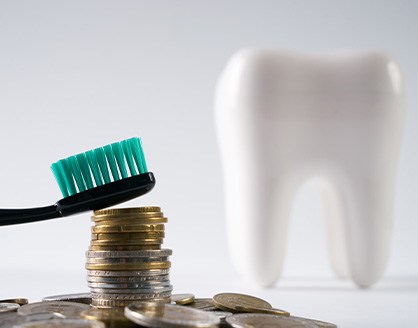
While dental implants may seem costly upfront, their long-term value makes them a fantastic investment. Unlike traditional dentures or bridges, implants can last decades with proper care, saving you from replacing or repairing them every few years. They also preserve your jawbone health and facial structure, reducing the risk of future issues with adjacent teeth.
Through the years, we’ve heard many patients say that getting dental implants was one of the best decisions they’ve ever made for their smile!
Does My Dental Insurance Cover Dental Implants?

Some dental insurance plans offer partial coverage for dental implants, such as the crown or abutment, while others may cover portions of related procedures like extractions or bone grafts. It all depends on your insurance company and plan.
If you’re unsure about the details of your coverage, our team will help you navigate your policy to maximize your benefits. Even if your implants aren’t fully covered, don’t worry—we have other ways to help make treatment affordable!
Making Dental Implants Affordable

At Robert A. Whitmore D.D.S., we understand that dental implants are a big commitment, which is why we offer flexible financing through CareCredit. This amazing program has helped millions of people afford the care they need by breaking their payments into manageable monthly installments!
Investing in your smile has never been easier or more accessible than now. So, contact our team today to schedule your consultation and find a plan that fits your budget!
Dental Implant FAQs

Dental implants are a preferred tooth replacement option thanks to their numerous benefits. That being said, they are quite an investment, so it pays to be well-informed about the procedure. We’re here to help. Here are the answers to some of the most common questions we receive about dental implants in Arlington. If you don’t see the information that you’re looking for below, don’t worry! Give us a call and we’d be happy to answer your questions and get you started with an initial consultation.
How Long Do Dental Implants Last?
The lifespan of dental implants typically depends on the health and lifestyle choices of the patient. To ensure that they last, be sure that you brush twice, floss, and rinse with a mouthwash daily. See your dentist for regular cleanings and checkups, and avoid chewing on anything particularly hard or sticky. With proper maintenance, implants can last upwards of three decades. This is several times longer than traditional bridges and dentures.
Does Getting Dental Implants Hurt?
The jawbone doesn’t have very many nerve endings, and your mouth will be numbed with a local anesthetic before the procedure begins. You will also most likely be sedated, lowering your body’s ability to register pain. While the surgery shouldn’t hurt, your mouth may be sore for a few days following. Take recommended over-the-counter and prescribed pain relievers as directed. Cold compresses can also help. If discomfort worsens instead of improving after two or three days, give us a call.
How Successful Are Dental Implants?
When placed by a skilled professional, dental implants have a very high success rate of over 95%! The success of your dental implants will depend on how well you take care of them with oral hygiene, routine checkups, and healthy lifestyle choices. Success can also vary depending on where the implant is located in the mouth. Molars receive more strain from chewing, so they may be slightly more likely to fail.
Will I Have to Take Off Work for Dental Implant Surgery?
Most patients only need to take one or two days off work to get dental implants. If your job is physically demanding, you may want to take three or four, as heavy exercise can divert blood from the implant site and delay healing. However, every case is different. During your initial consultation with Dr. Whitmore, you will receive a more specific recommendation to meet your needs.
